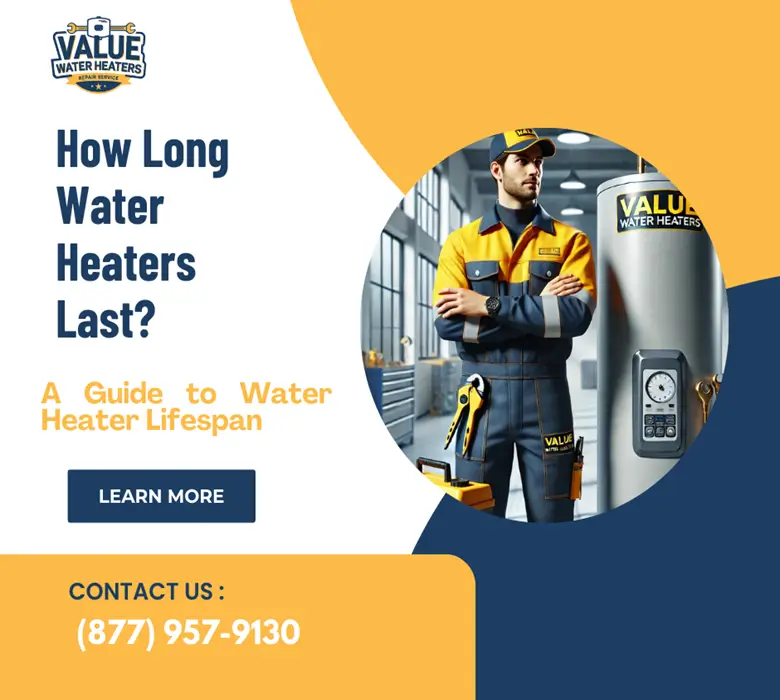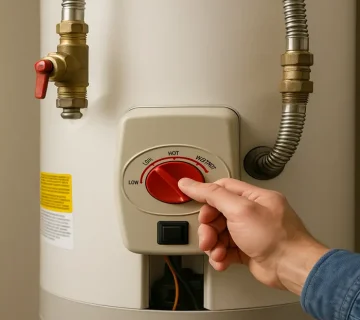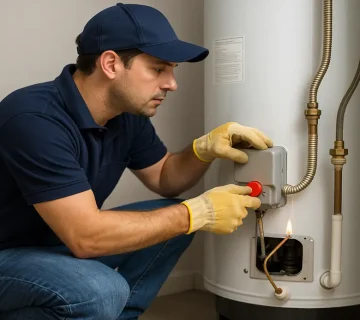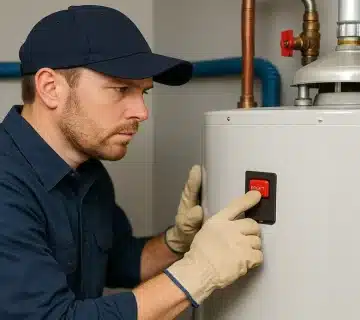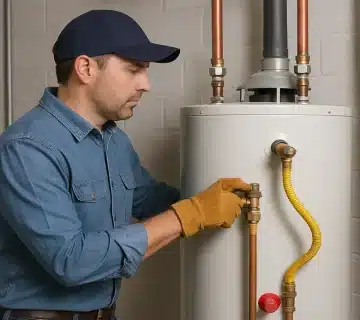Understanding your water heater lifespan is essential for making informed decisions about maintenance, replacement, and choosing the right type of water heater for your home. Several factors influence how long a water heater lasts, and different types of water heaters have varying lifespans. Below, we’ll explore the 10 crucial factors that affect lifespan and the average lifespan of different types of water heaters.
For more localized service information, check out our location on Bing Maps.
10 Factors That Affect Water Heater Lifespan
- Water Quality Hard water can significantly reduce your water heater’s lifespan by causing sediment buildup inside the tank. This buildup reduces efficiency and increases wear over time.
- Maintenance Frequency Regular maintenance, such as flushing the tank, checking the anode rod, and inspecting for leaks, helps extend your water heater’s lifespan and ensures optimal performance.
- Anode Rod Condition The anode rod prevents tank corrosion by attracting corrosive elements. If not replaced when worn out, the tank may corrode prematurely.
- Installation Quality A poorly installed water heater can lead to leaks, inefficiency, and a shorter lifespan. Always hire professionals for proper installation.
- Water Pressure Excessive water pressure strains the tank and piping, leading to leaks and faster wear. Keep water pressure within the manufacturer’s recommended range.
- Usage Demand Heaters used frequently or in larger households wear out faster due to higher demand on the system.
- Type of Water Heater The type of water heater you choose directly affects its lifespan. Tankless models last longer than traditional tank systems due to their design.
- Tank Material and Build Quality High-quality tanks made of durable materials like stainless steel are more resistant to rust and corrosion, lasting longer than lower-quality options.
- Climate and Environment Water heaters in humid, salty, or extreme climates are more prone to corrosion and damage, which can shorten their lifespan.
- Power Source Gas-powered water heaters typically have a slightly shorter lifespan (8–12 years) than electric models (10–15 years), depending on maintenance and usage.
Average Lifespan of Water Heater Types
Storage Tank Water Heaters
- Gas-Powered: 8–12 years
- Electric-Powered: 10–15 years
Traditional tank water heaters store a fixed amount of hot water and are the most common type found in homes.
Tankless (On-Demand) Water Heaters
- Average Lifespan: 20+ years
Tankless water heaters heat water as needed, avoiding the wear and tear associated with storing water in a tank.
Heat Pump (Hybrid) Water Heaters
- Average Lifespan: 10–15 years
These energy-efficient models use heat from the air or ground to warm water, making them eco-friendly and cost-effective over time.
Solar Water Heaters
- Solar Panels/Collectors: 20–25 years
- Storage Tank: 10–15 years
Solar water heaters rely on sunlight to heat water, offering long-term savings and environmental benefits.
Condensing Water Heaters
- Average Lifespan: 10–15 years
These units use exhaust gases to heat water more efficiently and are ideal for homes with high water usage.
Point-of-Use (POU) Water Heaters
- Average Lifespan: 8–12 years
Compact and designed for specific areas, POU water heaters deliver instant hot water to sinks or appliances but have limited capacity.
Tips to Extend Your Water Heater’s Lifespan
For detailed tips, visit our article on Proven Tips to Extend Water Heater Lifespan.
- Flush the Tank Annually: Remove sediment buildup to maintain efficiency and reduce wear on the system.
- Inspect the Anode Rod: Check the anode rod every 2–3 years and replace it when necessary.
- Use a Water Softener: In hard water areas, a water softener can reduce mineral buildup in the tank.
- Maintain Proper Water Pressure: Install a pressure-reducing valve if your home’s water pressure exceeds recommended levels.
- Insulate the Tank: Adding insulation reduces heat loss and improves efficiency, especially in colder climates.
- Schedule Professional Maintenance: Regular inspections by a professional can catch issues early and extend your water heater’s life.
Conclusion
Your water heater lifespan depends on a combination of factors like maintenance, water quality, and the type of heater you choose. While tankless water heaters offer the longest lifespan, proper care and regular maintenance can significantly extend the life of any model. Evaluate your household’s needs and invest in a high-quality water heater to enjoy reliable performance and long-term savings.
Learn more about water heaters and professional services on our website or watch helpful guides on our YouTube channel.

